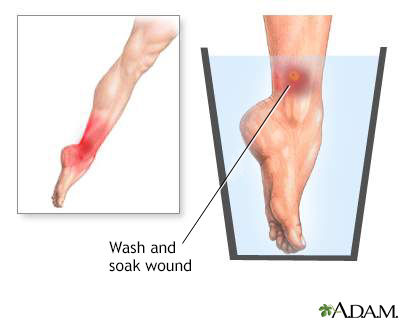Marine animal stings or bites
Stings - marine animals; Bites - marine animals
Marine animal stings or bites refer to venomous bites or stings from any form of sea life, including jellyfish.
There are about 1200 species of animals found in the ocean that are venomous. Many can cause serious illness or death.
The number of injuries caused by these animals has gone up in recent years because more people are taking part in scuba diving, snorkeling, surfing, and other water sports. These animals are most often not aggressive. Many are anchored to the ocean floor. Venomous marine animals in the United States are most often found along the California, Gulf of Mexico, and southern Atlantic coasts.

Symptoms of a marine animal sting can include pain, burning, swelling, redness, and bleeding. To treat a sting, keep the victim very still and wipe off stingers or tentacles with a towel or sand being careful to avoid contact with the tentacles or stingers. Wash the area with salt water. In some cases soaking the wound in very warm water is recommended.
Considerations
Most bites or stings of this type occur in salt water. Some types of marine stings or bites can be deadly.
Causes
Causes include bites or stings from various types of marine life, including:
- Jellyfish
- Portuguese man-of-war
- Stingray
- Stonefish
- Scorpion fish
- Catfish
- Sea urchins
- Sea anemone
- Hydroid
- Coral
- Cone shell
- Sharks
- Barracudas
- Moray or electric eels
Symptoms
There may be pain, burning, swelling, redness, or bleeding near the area of the bite or sting. Other symptoms can affect the entire body, and may include:
- Cramps
- Diarrhea
- Difficulty breathing
- Groin pain, armpit pain
- Fever
- Nausea or vomiting
- Paralysis
- Sweating
- Unconsciousness or sudden death from heart rhythm irregularities
- Weakness, faintness, dizziness
First Aid
Follow these steps to provide first aid:
- Wear gloves, if possible, when removing stingers.
- Brush off tentacles and stingers with a credit card or similar object if possible.
- If you do not have a card, you can gently wipe off stingers or tentacles with a towel. Do not rub the area roughly.
- Wash the area with salt water.
- Soak the wound in hot water no hotter than 113°F (45°C) for 30 to 90 minutes, if told to do so by trained personnel. Always test water temperature before applying it to a child.
- Box jellyfish stings should be immediately rinsed with vinegar.
- Fish stings and stings by Portuguese man-of-war should be immediately rinsed with hot water.
Do Not
Follow these cautions:
- Do not attempt to remove stingers without protecting your own hands.
- Do not raise the affected body part above the level of the heart.
- Do not allow the person to exercise.
- Do not give any medicine, unless told to do so by your health care provider.
When to Contact a Medical Professional
Seek medical help (call 911 or the local emergency number) if the person has difficulty breathing, chest pain, nausea, vomiting, or uncontrolled bleeding; if the sting site develops swelling or discoloration, or for other bodywide (generalized) symptoms.
Some bites and stings can result in serious tissue damage. This may require specialized wound management and surgery. It may also cause significant scarring.
Prevention
Things you can do to prevent a marine animal sting or bite include:
- Swim in an area patrolled by a lifeguard.
- Observe posted signs that may warn of danger from jellyfish or other hazardous marine life.
- Do not touch unfamiliar marine life. Even dead animals or severed tentacles may contain poisonous venom.
- If wading in water where stingrays are known to live, keep your feet on the bottom and shuffle them as you move forward.
- Wear a protective suit.
References
Auerbach PS, DiTullio AE. Envenomation by aquatic vertebrates. In: Auerbach PS, Cushing TA, Harris NS, eds. Auerbach's Wilderness Medicine. 7th ed. Philadelphia, PA: Elsevier; 2017:chap 75.
Auerbach PS, DiTullio AE. Envenomation by aquatic invertebrates. In: Auerbach PS, Cushing TA, Harris NS, eds. Auerbach's Wilderness Medicine. 7th ed. Philadelphia, PA: Elsevier; 2017:chap 74.
Callahan MV. Bites, stings, and envenoming injuries. In: Keystone JS, Kozarsky PE, Connor BA, Nothdurft HD, Mendelson M, Leder, K, eds. Travel Medicine. 4th ed. Philadelphia, PA: Elsevier; 2019:chap 48.
Curtis AM, Erickson TB. Venomous animal injuries. In: Walls RM, ed. Rosen's Emergency Medicine: Concepts and Clinical Practice. 10th ed. Philadelphia, PA: Elsevier; 2023:chap 53.
Seifert SA, Dart RC, White J. Envenomation, bites, and stings. In: Goldman L, Cooney KA, eds. Goldman-Cecil Medicine. 27th ed. Philadelphia, PA: Elsevier; 2024:chap 98.
Version Info
Last reviewed on: 11/2/2023
Reviewed by: Jesse Borke, MD, CPE, FAAEM, FACEP, Attending Physician at Kaiser Permanente, Orange County, CA. Also reviewed by David C. Dugdale, MD, Medical Director, Brenda Conaway, Editorial Director, and the A.D.A.M. Editorial team.
